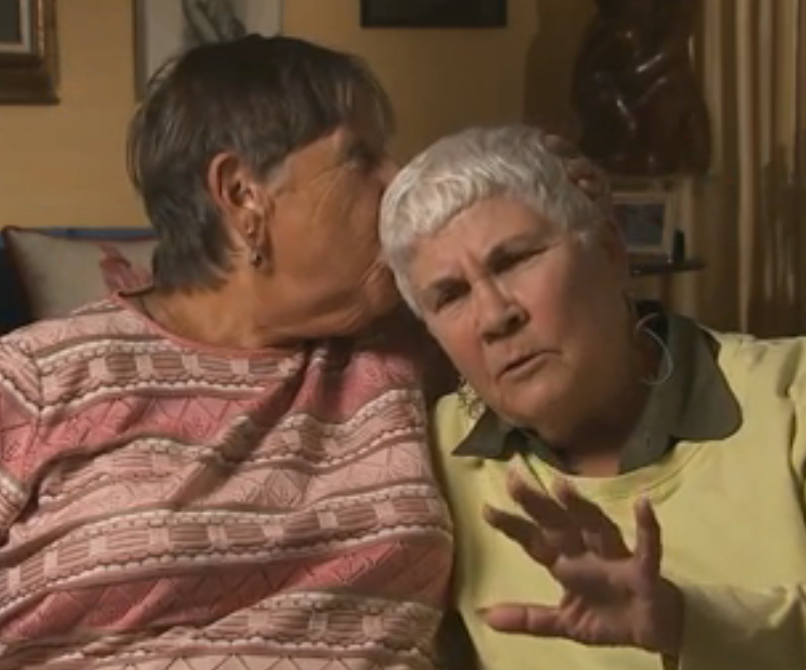Out In America, a major documentary from PBS on the American LGBT experience, doesn’t premiere until Wednesday in most U.S. cities. But for those of us lucky enough to be in Dallas, the show will air at 9:30 p.m. today on KERA. (It repeats at 3 a.m. June 12, in case you’re wondering.) Below is the trailer as well as a full press release about the doc. And here’s a review from Bil Browning at the Bilerico Project.
Watch the full episode. See more PBS Specials.
Emmy award-winning director Andrew Goldberg, in association with Oregon Public Broadcasting, today announced a new PBS special, OUT in America. The one-hour film will premiere, Wednesday, June 8 at 8:00 pm ET/PT (check local listings) on PBS in conjunction with National Gay & Lesbian Pride Month.
OUT in America is an uplifting collection of unique, transformative stories and inspiring personal narratives told through the lens of the country’s most prominent LGBT figures and pioneers, as well as many average, yet extraordinary, citizens from Gay, Lesbian, Bisexual and Transgender communities. The program weaves together diverse stories – from urban and rural America, from the heartland to New England, from San Francisco to Harlem. Deeply moving and often humorous, viewers will get a glimpse of awakenings, first crushes, unlikely soul mates, intimacy and liberation. While separated by circumstance and upbringing, the film’s subjects are all united in their shared experiences of self-discovery, coming out, pride and love as well as a triumph over adversity and a true sense of belonging. Against the backdrop of historical events, each also traces their own hopes, struggles, influences and contributions towards advancements in equality and broad social change.
“The first of its kind, OUT in America is a more realistic portrait of LGBT life than almost anything seen on TV before,” says Goldberg. “So often, media coverage of LGBT life in America is polarizing or exploitative of controversy and homophobia, or alternately LGBT individuals are presented as caricatures of a stereotype. OUT in America however focuses on empowerment, diversity and relationships.”
The special features interviews with and anecdotes from cult TV personality Andy Cohen (Bravo TV Host), famed Tales of the City author Armistead Maupin, country music star Chely Wright, humorist Kate Clinton, as well as legendary LGBT activists James Hormel (philanthropist), Urvashi Vaid (former Executive Director of the pre-eminent civil rights organization National Gay and Lesbian Task Force, recently cited in Out Magazine’s list of most influential men and women in America) and Dr. Patricia Hawkins (psychologist renowned for her early work with HIV patients). Other influential lesbians, gay men, bisexuals and transgender people in the film include: Reverend Peter Gomes, who came out on the steps of Memorial Church at Harvard; PJ Serrano, Puerto Rico’s first openly gay and HIV positive political candidate; a transgender police lieutenant, who transitioned while on active duty; a Muslim lesbian from the country of Mauritius; a gay rancher; the organizer of Capital Queer Prom; a Latino rapper; a West Point graduate and former Captain in the US Army; a drag queen; a great-grandmother; and “The Harolds,” a giddy bi-racial couple in their 80s, who reminisce, in unison, about their five decades together. “We’ve had a good life. We still love each other … it just gets better.”
OUT in America examines the ways in which LGBT Americans obtained a sense of freedom from social oppression by reconciling conflicts between their sexuality and other prominent factors in their public lives such as faith, family and service in the military. The film addresses the complexity of an individual’s tendency to embrace multiple identities across lines of race, gender, class, religion, age and nationality.
With early media coverage and public attention on the community primarily focused on gay men, OUT in America also looks at the patriarchal shift and growing role of lesbians in the rights movements, in particular their visibility in marches on Washington, a division and subsequent alignment with the feminist and women’s liberation movements and most significantly, the organizational change and growth in leadership as healthcare providers and activists during the early years of the AIDS crisis.















I missed OUT IN AMERICA, when is it scheduled again or where can I download a replay?